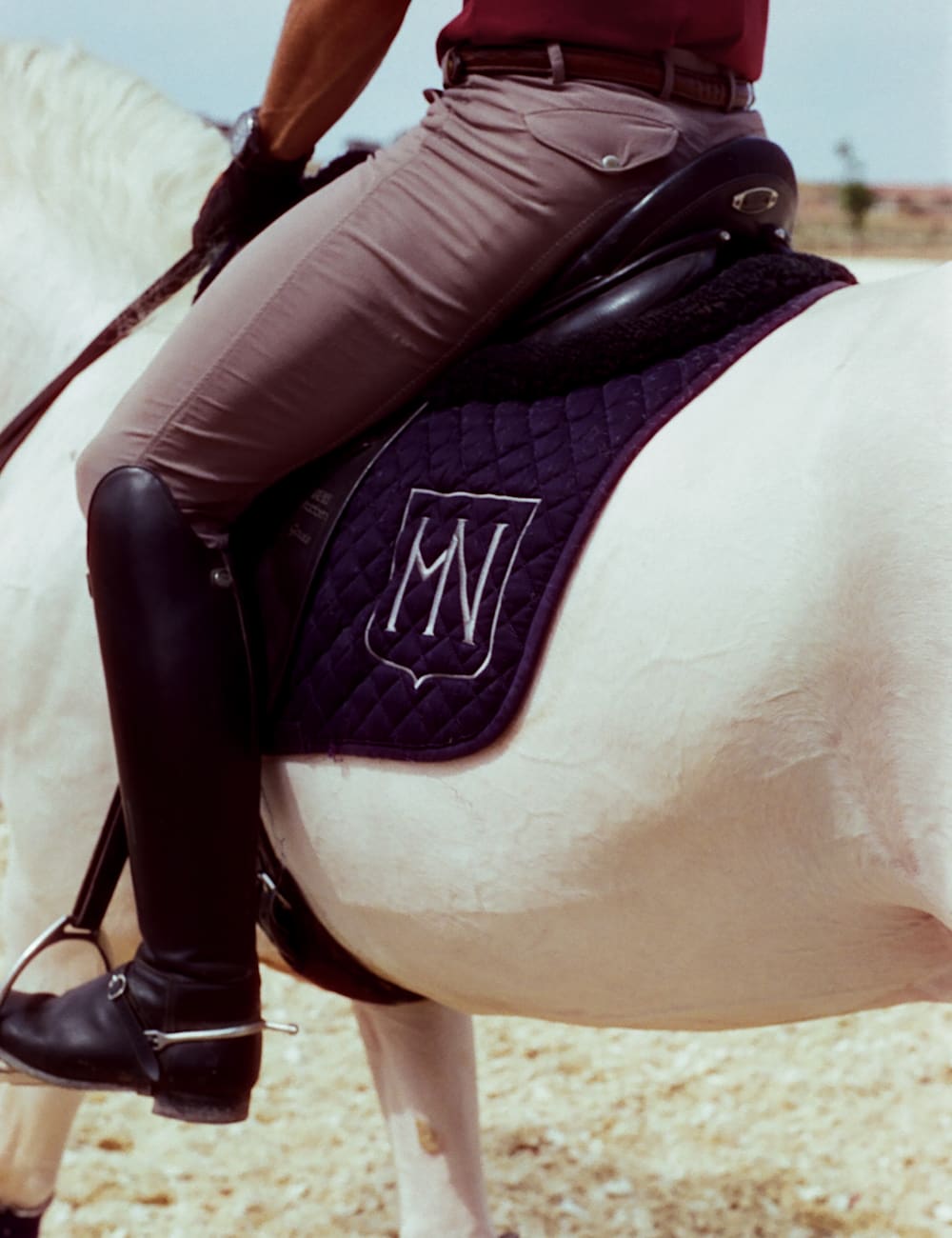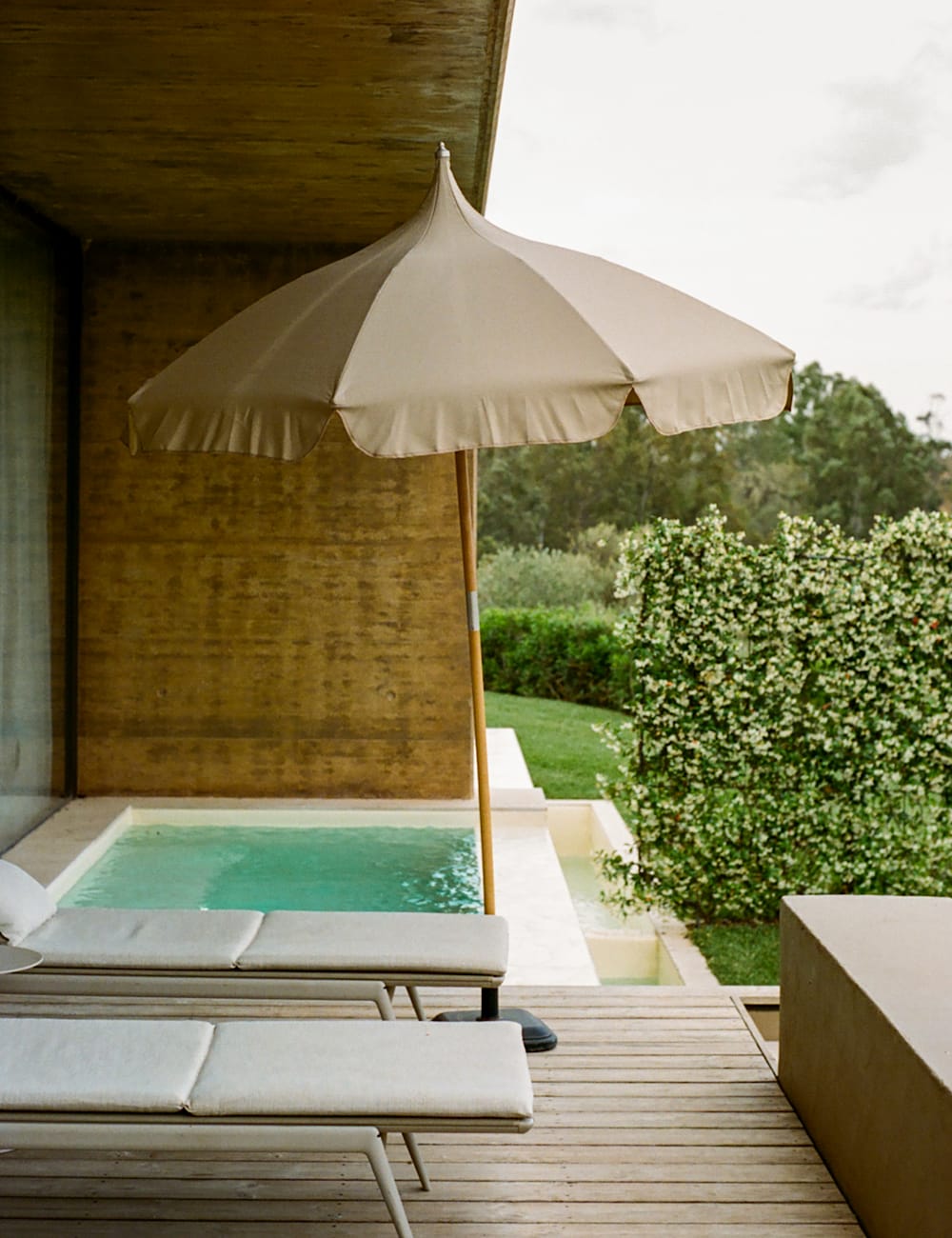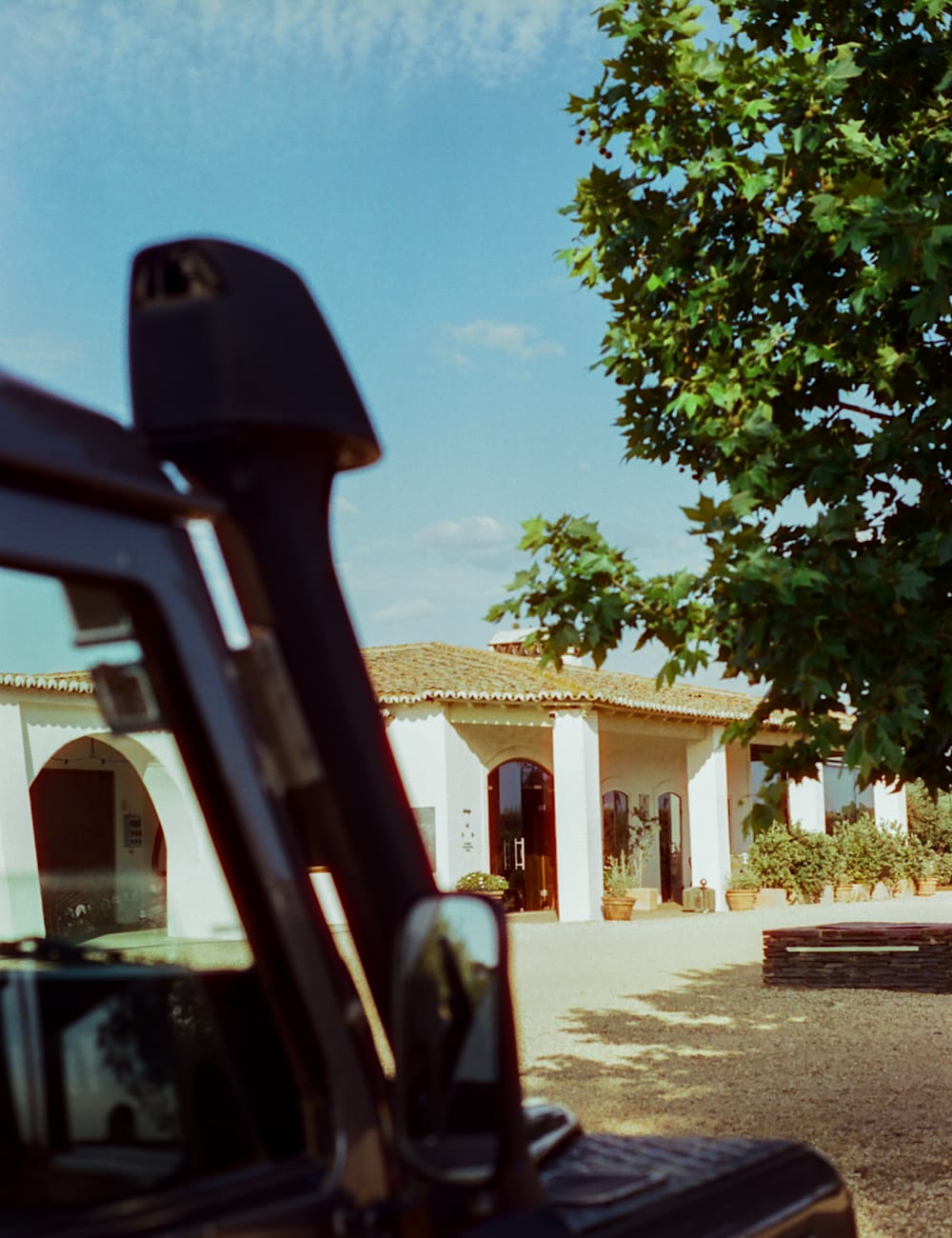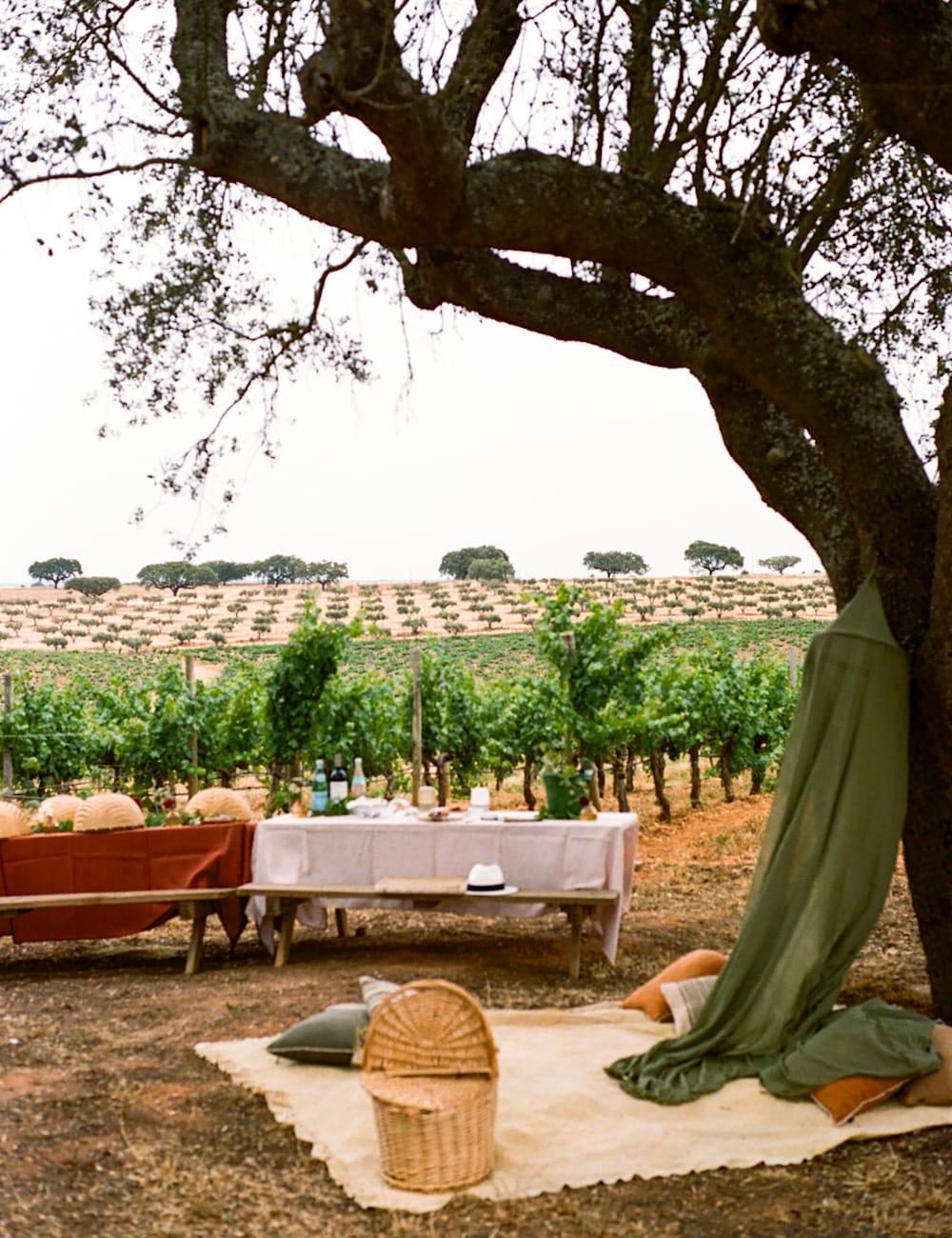Under radiant blue skies in Alentejo, Portugal, I am having a riding lesson in the most idyllic of circumstances at Herdade da Malhadinha Nova, a boutique hotel that’s also an organic farm, winery and stud for purebred Lusitano horses.
Pedro, the hotel’s resident breeder (who also happens to be an international dressage champion) is praising me in his accented English.

‘Very well! Yes, very well, very well!’
I smile at the compliment, even though I know that whatever I’ve just managed to do ‘very well’ is all down to my mount. His name is Zil, he is Pedro’s award-winning dressage horse, and he could probably win the Olympics riderless.
As Zil slows to a walk, I survey the surroundings – beyond this outdoor riding ring, there’s a golden, Edenic view of vineyards, lakes, cork-oak woods and grazing animals, all shimmering slightly in the rising midday heat.
Space, simplicity, and slow living are entirely the point of this Arcadian wonderland just an hour-and-a-half’s drive inland from Faro airport. And the success of it is down to the Soares family, who acquired these 450 rural Alentejan acres back in 1998 when there was nothing here except tumbledown farm buildings.

At first, they only had dreams of creating a vineyard – they planted the first vines in 2001 and the winery here quickly became one of the best in the region, with everything grown, produced and bottled on site.
A restaurant followed a few years later and, a few years after that, they added a handful of hotel rooms in a restored farmhouse. So, much like the produce that comes from the soil here, it’s a concept that has grown slowly, organically and very thoughtfully over time.
The family’s fierce love and protection for this land is in evidence everywhere. Surely it must be one of the only vineyards in the world where more and more vines have been planted with the express purpose of making less wine. It’s because they’re constantly trying to improve the quality rather than the quantity, so only pick about 40 per cent of their grapes each year.

Adorably, every wine label features a drawing by one of the Soares children: a smiling cow by Matilde, a beetle by Mateus, a fox by João Maria. It’s a homey touch that betrays how seriously they consider the contents of every bottle.
Quite apart from pesticides and chemicals of any sort (strictly proibida), there are no machines used on the farm, vineyard or orchards at all – the merino sheep cut the grass and the grapes are stomped by human feet (if you visit during harvest in August, you can squish them yourself).
In short, they know that nature knows best and leave the land alone to do its humming, buzzing, regenerative thing. It’s obviously appreciated by the fauna around here: hawks circle, peacocks strut, and Pedro’s herds of horses roam around freely with their foals.

Guests are largely left to their own devices, too. There are just 30 bedrooms on the property, with clusters of rooms set either in farmhouses that have their own character, unique setting and swimming pool, or in more modern, architectural suites tucked into a hill above the vines.
My friend and I were delighted to find ourselves billeted in the very special Arts and Crafts villa, a white-washed farmhouse with just two bedrooms that’s dedicated to Portuguese heritage craftsmanship and filled with art, pottery and textiles made by local artisans. The walls are a soothing sage-green – a nod to the olive groves outside – with flecked terrazzo floors and a hand-crafted light fixture made with bulrushes from the nearby Terges river.
After admiring our private pool, wrap-around terraces and full-sized kitchen stocked with Portuguese-made Vista Alegre porcelain, we took our welcome bottle of house-made Malhadinha white wine and bundt cake outside to ogle our new neighbours: a family of storks.

There’s a golf cart and an assortment of bicycles to borrow outside every lodging and you’ll soon find out why – the hotel’s facilities are so spread out that getting anywhere on foot is like crossing the Serengeti and would probably require supply lines.
Of course, if you don’t fancy driving, or plan to imbibe quite a few bottles of Malhadinha red at dinner time, the hotel staff can always escort you home in their fleet of vintage Land Rover Defenders. Or, you can take it up a notch with rides around the estate on the hotel’s quad bikes.
But we’re content with our trusty golf cart and these rides – or safari drives, as we soon term them – quickly become the highlights of our day. We trundle down dusty tracks and over plains, excitedly looking out for Iberian black pigs and Alentejana horned cattle in the wheaten landscape.

Of course, all these golf-cart expeditions, dressage lessons and dousing in the Alentejo’s fierce sun can really build up your appetite and, as you may expect, there were ample opportunities to sample the terroir’s bounty.
Aside from wine, beef, lamb and pork, Malhadinha is also self-sufficient in olive oil, vinegar, vegetables and honey; dairy comes from the next door village.
Breakfast is an abundant, alfresco affair that’s served poolside at the Terracotta farmhouse, the buffet table a still-life painting of ripe figs, pomegranates, cheese, pastries, pancakes and juices.

For dinner, everyone convenes in the glass-walled restaurant – it was the only time of day where there were more humans than animals in my eyeline. The menu was created by Michelin-blessed chef Joachim Kerper, who has an encyclopaedic knowledge of ancestral Alentejan recipes.
During our stay we feasted on traditional dishes of codfish with peas, Alentejana black pork, Tomahawk steaks, and, though I meant to report back on more of the puddings, the apple caramel pie (paired with house-made Madeira) was so heartrendingly good that I ordered it two nights in a row.
And while we ate some practically perfect mouthfuls at dinner, the meal that will stay with me forever was our simple picnic lunch among the vines where we sat for hours, contentedly listening to the sound of birdsong above while ice cubes melted in our chilled glasses of Monte de Peceguina rosé and the best of Malhadinha’s wholesome magic was on display.
Find out more about Herdade da Malhadinha Nova or discover our complete collection of Alentejo hotels
All photography by Hannah Dace

